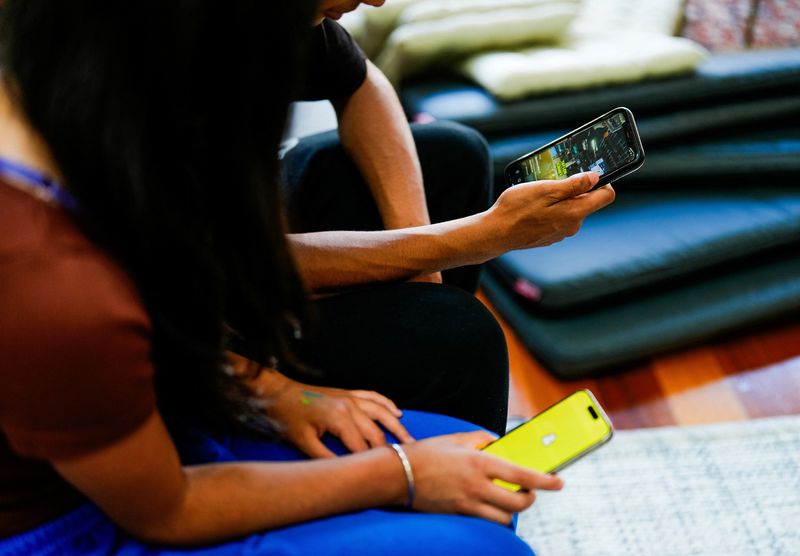By Byron Kaye and Alasdair Pal
SYDNEY (Reuters) – Software (ETR:SOWGn) testers hired by Australia’s government to determine how to enforce the world’s first national teen social media ban have worked on defence and election contracts but will use another experience to guide their study: wrangling their own children online.
“We’re all parents of kids of various ages and we’re definitely aware of all the little tricks kids do,” said Andrew Hammond, general manager at tech contractor KJR which will conduct the trial on about 1,200 randomly chosen Australians from January to March.
“Kids are quite resourceful so we’ll definitely have our eyes and ears open,” added Hammond, whose company’s previous projects included checking deployment software for Australian troops in Afghanistan.
The study, one of the biggest ever trials of age-checking technology, will likely set the course for lawmakers and tech platforms around the world as they navigate a push to age-restrict social media at a time of growing concern about youth mental health and data collection.
From late 2025, platforms including Meta (NASDAQ:META)’s Instagram, Elon Musk’s X, TikTok and Snapchat must show Australians they are taking reasonable steps to keep out users under 16 or face fines up to A$49.5 million ($32 million). Google (NASDAQ:GOOGL)’s YouTube, a classroom staple, is exempt.
But the legislation does not specify what those reasonable steps must be. That is down to the trial, overseen by the Age Check Certification Scheme, a British consulting firm, which expects about 12 participating tech firms and must give recommendations by mid-2025.
Options include age estimation where a user’s video selfie is biometrically analysed then deleted; age verification where a user uploads identifying documents to a third-party provider which sends an anonymous confirmation “token” to the platform; and age inference where a user’s email address is cross-checked with other accounts.
“The approach the Australian government takes could influence how other countries approach online age checks for social media content,” said Julie Dawson, chief policy and regulatory officer at age-verification company Yoti, which does age checks for Meta’s new system of heightened privacy settings for teenage Instagram users.
Some European countries and U.S. states have legislated age minimums for social media, but none has rolled out an enforcement regime due to legal challenges based on preserving privacy and free speech.
Even lawmakers in Australia’s conservative opposition, whose support was needed to get the centre-left government’s ban through parliament, warned the ban could justify collecting personal information – an echo of a November post from X owner Elon Musk that it “seems like a backdoor way to control access to the Internet by all Australians”.
Communications Minister Michelle Rowlands told parliament the ban was “not about government mandating any form of technology or demanding any personal information handed over to social media companies”.
A last-minute change to the law stipulates that platforms asking for identifying documents must offer an alternative age-gate.
YOUNG USERS, YOUNGER TECH
Pressure to block minors from parts of the internet has been around since pornography and gambling websites overran the early worldwide web. It has taken on a new urgency since a Meta whistleblower leaked internal emails in 2021 purportedly showing knowledge its products were harmful to young users. Meta has said the documents were misinterpreted.
Rising demand has spurred technological development, but no product yet is fool-proof when it comes to combining accuracy, privacy, security and user-friendliness, said Tony Allen, CEO of the Age Check Certification Scheme, which will test products for Australia on those criteria.
Adding to the challenge, many people in the age range targeted by bans do not have common identifying documents such as a driver’s licence or credit card.
That helps the case for age-checking technology involving analysis of a person’s features, such as facial wrinkles or their hand.
Yoti, Meta’s age-checking partner, says its accuracy has improved to the point where it can pick more than 99% of people aged 13-17 as under 25. It says its standard deviation of error in guessing the age of an 18-year-old is just over one year.
That may not yet be accurate enough for an age restriction in a country of 27 million people, said Konstantin Poptodorov, director of fraud and identity for digital identification company LexisNexis Risk Solutions, while noting the rapid improvements and uptake of technologies such as facial recognition in the past decade.
Meta’s policy director for Australia and New Zealand, Mia Garlick, said Yoti benefitted Instagram’s teen privacy policy but appearance-wise “some people grow up really quickly, and some people don’t”.
Meta didn’t know if expanding its Yoti arrangement would satisfy the Australian ban because “we don’t know if what we do currently is going to be considered ‘reasonable steps’”, she added.
Providers which rely on uploaded identification documents may participate in the trial but “almost the whole ethos behind the way age assurance works is ‘we don’t want to collect any data’,” said age certification scheme CEO Allen.
Software testers would ask some trial participants to try and fool the technology with appearance-adjusting filters but would weed out only the products which failed to stop workarounds deemed cheap and scalable.
Allen had no front-runner for what product he would recommend but did predict one recommendation.
“There should be choice for consumers,” he said.
“They should all be as effective and meet a certain level of assurance, but if you’re looking for a silver bullet you won’t find it.”
($1 = 1.5411 Australian dollars)

